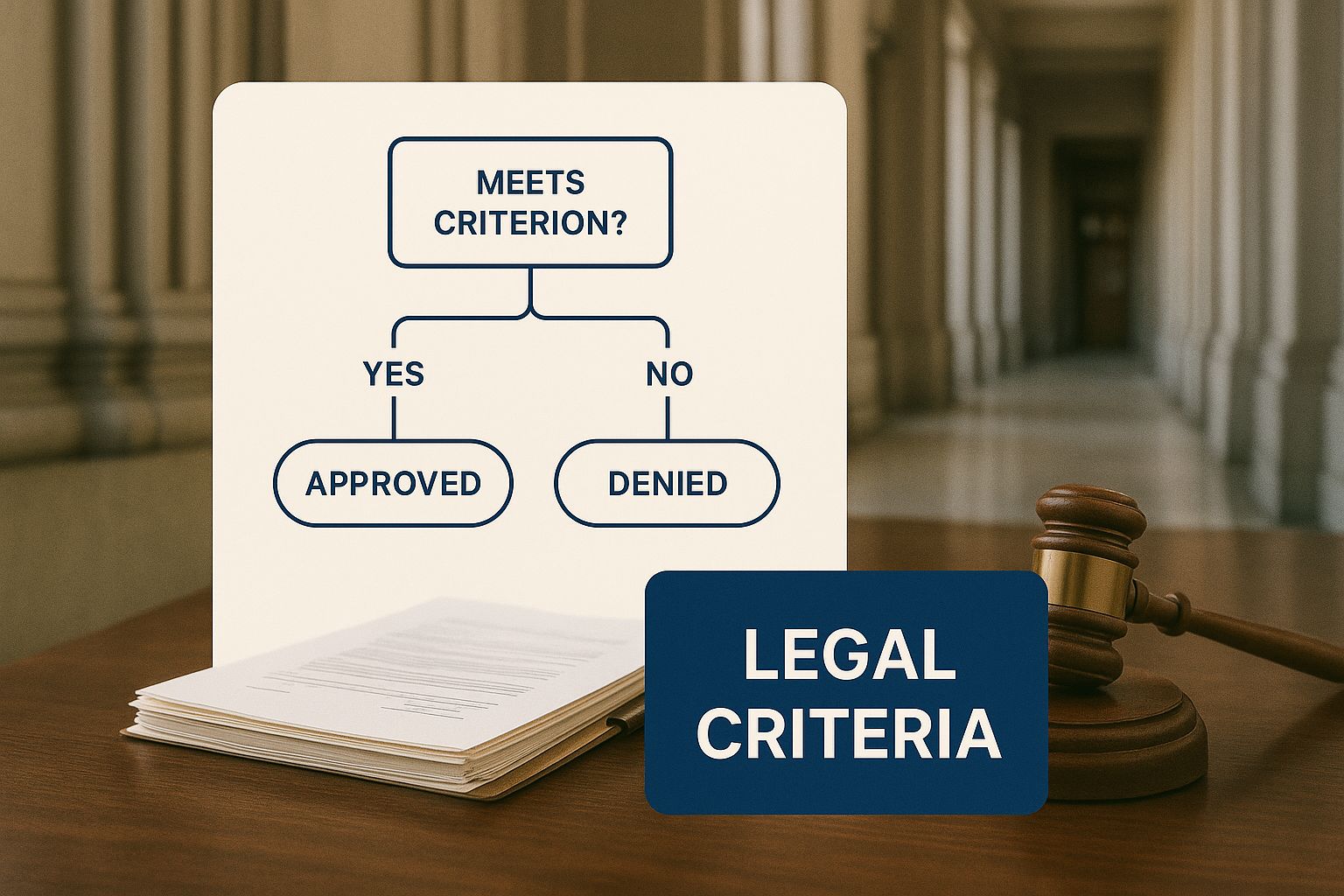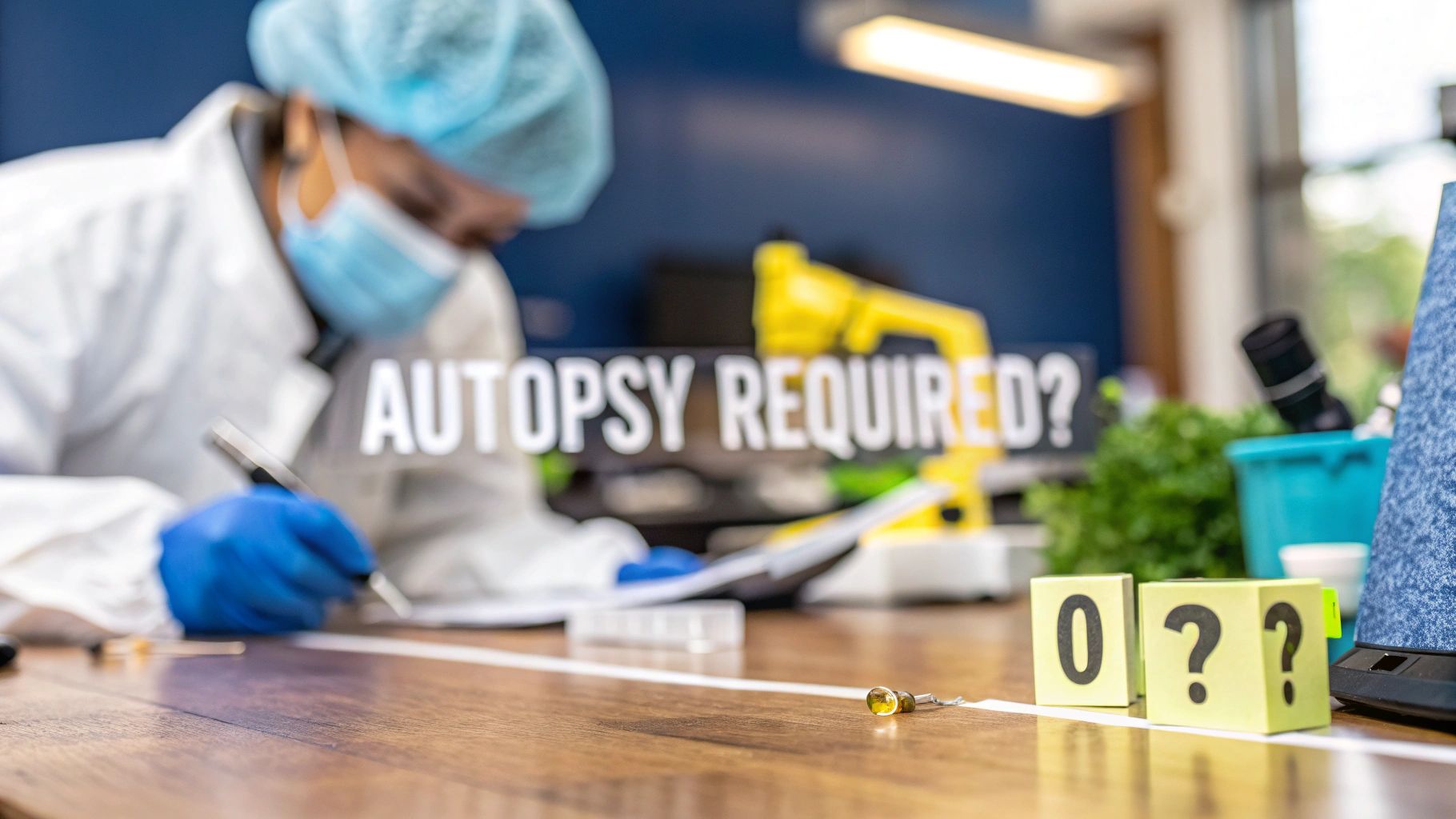When a loved one passes away, you are often faced with a series of difficult and unfamiliar decisions. Navigating medical and legal procedures during a time of grief can feel overwhelming. Among the most common points of confusion is understanding when an autopsy is necessary.
The answer is often simpler than it seems: an autopsy is legally required only under specific circumstances, such as when a death is sudden, unexpected, or occurs under suspicious circumstances. In these cases, a public official like a Medical Examiner or Justice of the Peace has the legal authority to order one. In all other situations, an autopsy is a private choice, made by a family seeking definitive answers.
The Two Paths: Required vs. Elective Autopsy
Losing someone is a profoundly disorienting experience, and it is completely normal to have more questions than answers. The word "autopsy" often arises during these moments, and it can feel intimidating. This article provides educational information to help clarify the process, but it is not a substitute for medical or legal advice.
It helps to understand that there are two distinct paths. The first is a forensic autopsy, which is not a choice but a legal necessity. The second is a private autopsy, an option that families can decide to pursue on their own for personal reasons.
What is the Difference?
The main distinction boils down to who authorizes the procedure and why. A legally required autopsy serves the public interest as part of a formal investigation. A private autopsy, on the other hand, serves a family’s personal need for clarity and peace of mind.
Here’s how they break down:
Legally Required Autopsy: This is ordered by a public official, such as a Medical Examiner, when a death falls under specific circumstances outlined by Texas law. These situations usually involve violent, suspicious, or unexpected deaths where the cause is not immediately clear, or there is a concern for public safety. In these cases, the cost is covered by the state.
Family Requested Autopsy: Often called a private or clinical autopsy, this is initiated by the legal next of kin. Families might choose this route to obtain a definitive answer about a long-standing illness, investigate potential concerns with medical care, or uncover genetic conditions that could impact other family members.
If you are trying to determine the immediate next steps after a loss, a good practical guide on what to do when someone dies can be an invaluable resource, walking you through the process one step at a time.
At its heart, an autopsy is a detailed medical examination designed to provide definitive answers about the cause and manner of death. Whether it is ordered by the state or requested by a family, its primary goal is to replace uncertainty with medical fact.
Required vs. Elective Autopsy At a Glance
To make it even clearer, here’s a simple table comparing the two. This can help you quickly see the key differences when you are trying to understand which path may apply to your situation.
| Criteria | Legally Required (Forensic) Autopsy | Family Requested (Private) Autopsy |
|---|---|---|
| Who Initiates It? | Medical Examiner or Justice of the Peace | The family or legal next of kin |
| Primary Purpose? | To determine cause and manner of death for legal or public interest | To answer a family's questions about illness, medical care, or genetic risks |
| Who Pays? | The county or state (no cost to the family) | The family or estate requesting the service |
| Consent Needed? | No, it is legally mandated by law | Yes, requires explicit consent from the legal next of kin |
This table shows that while both are medical examinations, their purpose, authority, and financial responsibility are worlds apart. Understanding this basic framework is the first step toward making an informed, confident decision during an incredibly difficult time.
At https://www.texasautopsyservices.com/, we understand how sensitive these situations are. We are here to provide clear, compassionate information to help you find the answers you deserve.
Legal Triggers for a Mandatory Autopsy in Texas
When a death occurs, the state has a significant responsibility to protect public health and ensure that justice is served. In Texas, certain situations legally require an investigation by a public official—either a Medical Examiner or a Justice of the Peace. It is their duty to determine if an autopsy is necessary to establish the facts.
This is not an arbitrary decision. It is guided by specific laws designed to find clear answers when a death is sudden, violent, or otherwise unusual. The ultimate goal is to pinpoint an accurate cause and manner of death, which then becomes part of the permanent public record.
When State Law Requires an Investigation
Under Texas Code of Criminal Procedure, Chapter 49, an official review, known as an inquest, is triggered by any death that does not appear to be from expected, natural causes. If any of these legal criteria are met, a medical examiner or justice of the peace must be notified.
The most common triggers include:
- Unattended Deaths: This occurs when a person is found deceased and has not recently been under a physician's care for the condition believed to have caused the death.
- Deaths from Violence or Unnatural Means: This broad category covers homicides, suicides, and any death resulting from physical injury, regardless of how much time has passed since the injury occurred.
- Sudden or Unexplained Deaths: If an individual who appeared to be in good health dies without warning, an investigation is required to rule out hidden medical conditions or foul play.
- Deaths in Custody: Any death of an individual in jail, prison, or police custody automatically requires an official inquest.
This image helps visualize the different legal criteria that often lead to a mandatory autopsy.

As you can see, the reasons range from suspected criminal activity to potential public health crises, all of which legally obligate the state to take a closer look.
The Role of the Medical Examiner and Justice of the Peace
In Texas, the authority to order a forensic autopsy rests with these officials. The specific system often depends on the county. Major metropolitan areas typically have a dedicated Medical Examiner's office staffed with forensic pathologists. In many rural counties, an elected Justice of the Peace holds this responsibility and will engage a pathologist to perform the procedure when needed. You can find more details about the authorities in your area and the counties they serve on our website.
It is crucial to understand that when an autopsy is legally required, family consent is not necessary. The decision belongs entirely to the state official, as the investigation serves a public and legal duty that takes precedence.
For instance, if someone dies in a workplace accident, an autopsy provides critical information not just for the grieving family but also for safety investigators and any potential legal proceedings. Similarly, if a new or mysterious illness is the suspected cause, the findings are vital for protecting the community from a possible health threat. This state-mandated process ensures every death is properly examined, providing factual answers for families and for the official record.
How Public Health Crises Reshape Autopsy Needs
The circumstances under which an autopsy is required are not static. They can change dramatically in response to a major public health crisis. Such events compel medical and legal authorities to adapt their procedures to understand and combat a new threat. In these moments, the autopsy becomes a powerful tool for gathering critical insights into an emerging disease.
There is no better recent example of this than the COVID-19 pandemic. This global crisis serves as a case study of how the need for autopsies can evolve in real-time to protect public health.

A Race for Answers During a Pandemic
During the early days of the pandemic, a great deal of uncertainty existed. In response, the standard approach to autopsies was temporarily re-evaluated. Initially, some medical centers paused autopsy procedures due to genuine concerns about exposing medical staff to a novel and potentially deadly aerosolized virus.
However, that initial caution quickly gave way to a pressing need for answers. You can explore more about the evolving role of autopsies during COVID-19 and see how vital they became in providing pathological evidence.
As the number of deaths increased, physicians and scientists recognized they were fighting an enemy they did not fully understand.
An autopsy provides a direct look at how a disease affects the body—something that imaging and laboratory tests alone cannot fully reveal. It represents the ultimate ground truth in medicine.
This undeniable need for definitive information made the autopsy indispensable once again. Pathologists performing these procedures provided the medical community with its first clear view of how SARS-CoV-2 was attacking the human body. They documented the widespread blood clotting, the severe and unusual lung damage, and the devastating inflammation in multiple organs, from the heart to the brain.
From Medical Insight to Public Protection
The information gathered from these autopsies was not merely for academic publication. It had an immediate, real-world impact on treating patients and creating public safety measures.
- Improving Treatment Protocols: The discovery that the virus caused extensive blood clots led clinicians to use anticoagulant therapies more aggressively, a change in protocol that saved many lives.
- Guiding Public Health Policy: Understanding exactly how the virus spread and which organs were most vulnerable helped officials create effective guidelines on masking, social distancing, and protecting high-risk populations.
- Informing Vaccine Development: Autopsy findings also gave researchers a much deeper understanding of the body's immune response to the virus, which was invaluable knowledge for those racing to develop effective vaccines.
This recent history demonstrates that the question "when is an autopsy required?" can sometimes have an answer that extends far beyond a single individual to the well-being of an entire community. During a crisis, the autopsy shifts from a tool for determining an individual cause of death to a vital source of intelligence for saving the living.
We recognize that these topics are complex and often difficult to contemplate. If you have questions about the autopsy process or need guidance, our team is here to offer clear and compassionate support.
Deciding to Request a Private Autopsy
When the medical examiner or justice of the peace determines that a forensic autopsy is not required, families may be left with lingering questions or a sense of unease. This is where a private autopsy can offer a path forward, providing clear, definitive answers during a time of profound uncertainty.
Opting for a private autopsy is a deeply personal choice. It is a procedure that is completely independent of any state-mandated investigation, requested and funded directly by the family or the deceased’s estate. The goal is to obtain a complete and accurate understanding of why a loved one passed away.
Common Reasons Families Choose This Path
The reasons a family might seek a private autopsy are varied, but they usually stem from a fundamental need for truth and closure.
Perhaps the official cause of death feels incomplete or does not align with your observations. When a loved one’s health declined suddenly or took an unexpected turn, a detailed examination can either confirm what was believed or uncover a previously unknown medical issue. This certainty can be a powerful source of comfort.
In other cases, the motivation is to protect the health of living family members. An autopsy can reveal hereditary conditions that might otherwise go undetected.
- Discovering Genetic Risks: Identifying inherited conditions, like specific heart diseases or a predisposition to certain cancers, can be a gift to future generations. This vital information allows living relatives to pursue proactive screening and preventative care.
- Addressing Medical Treatment Concerns: If you have questions about the care your loved one received in a hospital or other medical facility, an independent autopsy offers an unbiased, third-party review of their final health status.
- Providing Evidence for Legal Matters: The findings from a private autopsy can be invaluable in legal situations, including settling insurance claims, resolving workers' compensation disputes, or providing crucial evidence in potential medical malpractice cases.
A private autopsy is more than just a medical procedure; it is a search for truth. It empowers families to replace nagging doubts with concrete answers, creating a firm foundation for both emotional healing and practical next steps.
When families are looking for answers, a private autopsy can provide the clarity they need. Below are some of the most common reasons families turn to us for help.
Common Reasons Families Request a Private Autopsy
| Reason | Description | Example Scenario |
|---|---|---|
| Unexplained or Sudden Death | The official cause of death is listed as "natural causes" but feels ambiguous or doesn't align with the person's known health. | A relatively healthy 50-year-old dies unexpectedly in their sleep, and the family wants to understand the specific cardiac or neurological event that occurred. |
| Concerns About Medical Care | The family has questions about the quality of medical treatment received leading up to the death and suspects a potential error or misdiagnosis. | An elderly patient passes away after a routine surgery, and the family wants to confirm whether a post-operative complication was the cause. |
| Hereditary Disease Screening | There is a family history of genetic conditions, and relatives want to know if the deceased carried a specific gene to inform their own health decisions. | A young mother dies from a brain aneurysm, and her siblings want to know if it was caused by a hereditary vascular condition so they can be screened. |
| Legal or Insurance Disputes | A clear, medically-backed cause of death is needed to resolve an insurance claim, a workers' compensation case, or a potential lawsuit. | A worker collapses and dies on a job site. The family needs to determine if the death was related to a pre-existing condition or a work-related incident. |
| Personal Peace of Mind | The family simply cannot move forward without knowing for certain what happened. The need for closure is the primary driver. | A family is haunted by "what ifs" and unanswered questions, and they believe a definitive answer is the only way to begin the grieving process. |
This table illustrates just a few of the situations where a private autopsy can bring immense value, turning uncertainty into understanding.
How to Arrange a Private Autopsy
The process is often more straightforward than you might think and puts the family in control. Since it is not ordered by the state, the first step is to contact a private pathology group. You can learn more about what's involved by reading about arranging private autopsies and how the process works from start to finish.
Timing is an important consideration, as the procedure yields the most accurate results when performed as soon as possible after death. A qualified private pathologist will coordinate respectfully and seamlessly with your chosen funeral home to ensure there are no delays or disruptions to your planned services.
Ultimately, the decision to pursue a private autopsy is about taking a proactive step when you may feel powerless. It is an action that can bring peace of mind and provide the factual clarity your family needs to move forward.
The Modern Role of the Autopsy in Medicine
While autopsies are a cornerstone of legal investigations and public health, their place in everyday medical practice has changed dramatically over the last few decades. It used to be common for an autopsy to be performed after a death in a hospital, but that is no longer the case. This shift has sparked a complex and important conversation among medical professionals about its value today.
Part of this trend is understandable—diagnostic technology has made incredible leaps. Tools like MRI and CT scans give physicians a detailed view inside the body, often pinpointing the cause of illness with remarkable accuracy before a patient passes away. Consequently, some may view the autopsy as a less essential step for simply confirming a diagnosis.
Why Fewer Autopsies Concern Medical Experts
However, even with advanced technology, many in the medical and scientific communities are concerned about declining autopsy rates. According to data cited by the National Institutes of Health, in the 1950s, autopsies were performed in approximately 50% of all hospital deaths. Between 2003 and 2020, that number had fallen to an average of just 3.66%.
This decline is significant because the autopsy is still considered the undisputed ‘gold standard’ for determining the precise cause of death. Even our best imaging and diagnostic tools have limitations and can sometimes miss critical information.
The autopsy remains an irreplaceable tool for medical quality control. It provides a final, conclusive opportunity to confirm clinical diagnoses, identify unexpected conditions, and learn from medical outcomes, ultimately improving care for future patients.
The modern practice of autopsy, especially concerning consent and ethics, is deeply intertwined with medical law, which shapes the regulations for both required and elective procedures.
The Irreplaceable Value of the Autopsy
Beyond confirming the cause of death for an individual, autopsies play a critical role in advancing medicine and protecting public health. The detailed information they provide is vital for several reasons:
- Accurate Public Health Data: The findings help epidemiologists track the prevalence of diseases, spot new health threats as they emerge, and understand the real-world impact of illnesses across a population.
- Medical Education: For medical students and residents, there is no substitute for an autopsy. It offers direct, hands-on insight into how disease physically affects the human body—something a textbook or computer simulation cannot fully replicate.
- Advancing Medical Research: Postmortem examinations have been essential to our understanding of countless diseases, from Alzheimer's to heart conditions. This work directly paves the way for new treatments and potential cures.
So, although hospital autopsies are performed less frequently today, their role as the final word in medicine remains as critical as ever. They ensure diagnostic accuracy, advance medical knowledge, and provide families with the complete answers they deserve.
We understand that considering an autopsy can bring up difficult emotions and complex questions. If you need guidance, our team is here to provide clear and compassionate information.
Common Questions About the Autopsy Process
When you are coping with the loss of a loved one, logistical complexities are the last thing you want to face. An autopsy can feel like an overwhelming and unfamiliar procedure, so it is completely natural to have questions. Let's address some of the most common concerns to help bring clarity during a difficult time.
Can Our Family Refuse a Legally Required Autopsy?
This is one of the first and most important questions many families ask. When an autopsy is ordered by a Justice of the Peace or a Medical Examiner, it is a legal requirement, not a request. In these situations, officials have the authority to proceed without the family's consent.
The reason for this is that the state has a duty to investigate certain deaths to protect public health, ensure justice is served, or uncover potential safety risks. While you can and should communicate your wishes and any religious objections, the legal mandate will almost always take priority if the death falls under the official's jurisdiction.
Who Is Responsible for the Cost of an Autopsy?
The question of cost depends entirely on who ordered the autopsy. This is a critical point for families to understand.
- Legally Required Autopsy: If a public official like a Medical Examiner orders the autopsy as part of an official investigation, the county or state covers the full cost. The family is not charged. It is considered a public service, and 100% of the cost is covered.
- Private Autopsy: If the family requests an autopsy to obtain personal answers, then the cost is the responsibility of the family or the deceased's estate. It is always recommended to get a clear, upfront quote from the private pathology service you choose.
Will an Autopsy Delay the Funeral?
Most people are relieved to learn that an autopsy should not significantly delay funeral plans. Pathologists are acutely aware that families are waiting and work with great respect for both the deceased and the grieving family.
The procedure itself is typically completed within 24 to 48 hours after the body arrives at the facility. The examination is performed with such care that it should not interfere with an open-casket viewing, should you choose one. Once the examination is complete, the body is promptly released to your chosen funeral home. Communication is key; keeping your funeral director informed allows them to coordinate all arrangements smoothly.
A common myth is that an autopsy is a long, drawn-out process that disrupts all arrangements. The reality is that it is an efficient and methodical procedure designed to provide answers without adding extra stress to a family.
How Does a Medical Examiner Differ from a Coroner?
These terms are often used interchangeably, but their roles and qualifications can be very different depending on the state and county.
A Medical Examiner (ME) is a physician—specifically, a forensic pathologist who has completed years of specialized medical training to determine the cause of death. They are appointed, non-elected professionals. Here in Texas, major counties like Harris, Dallas, and Travis use the Medical Examiner system.
In contrast, a Coroner is typically an elected official who may or may not have a medical background. In a jurisdiction with a coroner system, if an autopsy is deemed necessary, the coroner must engage a pathologist to perform the procedure. Despite these differences, both officials have the legal authority to investigate deaths and sign the death certificate.
If you have questions about private autopsy services, our team at Texas Autopsy Services is here to help. We know these inquiries arise during a time of immense stress and grief. Please do not hesitate to contact our compassionate team by phone or email to discuss your needs with the utmost care and confidentiality.

